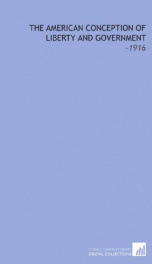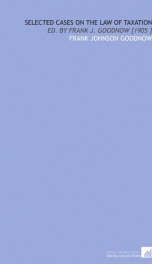municipal problems

Purchase of this book includes free trial access to www.million-books.com where you can read more than a million books for free. This is an OCR edition with typos. Excerpt from book: mere details of municipal organization that the mind of man could well devise,1 experiments which are in many cases contradictory one with the other. Hardly any two city charters will be found to agree in even the important details of municipal organization. Indeed, the perusal of the charter of a single city will oftentimes reveal the fact that its organization is not based on any fundamental theory. Thus we often find in the same city certain executive officers elected by the people, others appointed by the mayor and council, and still others appointed even by the state governor or legislature. Most city charters further show the influence upon them of all the great waves of general political thought which have swept over the country during the past century. Thus we find very commonly the influence of the principle of the separation of powers. While this principle lies at the foundation of our state and national government, it has been held by the courts never to apply, unless expressly so provided, to our local government. Further, as a matter of fact, it did not govern the organization of municipalities at the time the early constitutions which adopted itfor the state governments were put into force. But in hardly any city in which the separation of the mayor and executive departments from the council has been provided, has there been a clear distinction made between what is really administrative and executive and what is legislative in character. The power to make contracts is often left with the council, while the power of appointment which, if the mayor and council are to be separated, should be entrusted to the mayor alone, is most frequently exercised by the mayor and council conjointly. 1 As Dr. Shaw well says (Municipal Government in Continental Europe, p. 305) : " I...
Info about the book
Author:
Series:
Unknown
ASIN:
B0006QFZ3K
Rating:
4/5 (3)Your rating:
0/5
Languge:
English
Users who have this book
Users who want this book
What readers are saying
What do you think? Write your own comment on this book!
write a commentGenre
if you like municipal problems try:
Other books by this author
Do you want to read a book that interests you? It’s EASY!
Create an account and send a request for reading to other users on the Webpage of the book!






